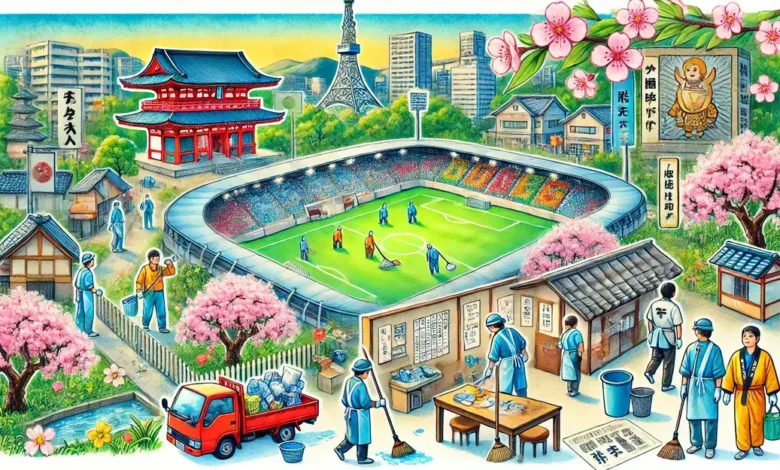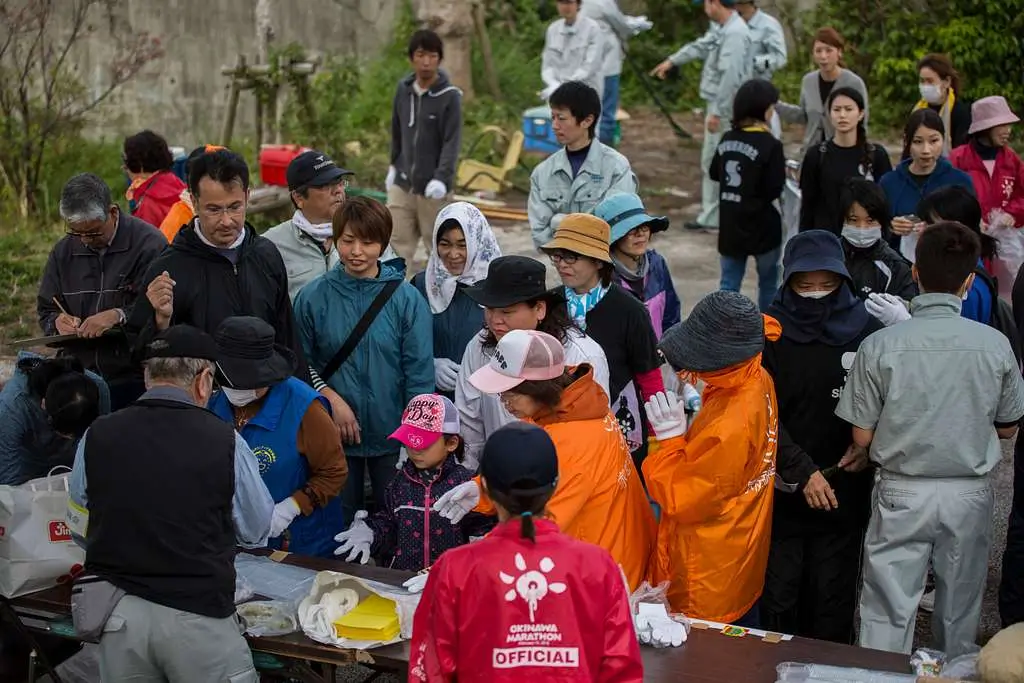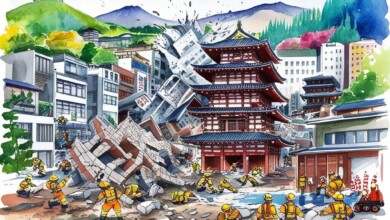Culture of Cleanliness in Japan: The Secrets Behind Daily Life

Japan’s remarkable dedication to cleanliness is a cultural trait deeply ingrained in daily life. From the meticulous tidiness of public spaces to personal hygiene practices, the Culture of Cleanliness in Japan is a reflection of values that prioritize respect, community, and harmony. This cultural obsession is not only seen in day-to-day activities but also prominently displayed during international events like the World Cup, where Japanese fans and players alike showcased their commitment to maintaining cleanliness. Discover the secrets behind this fascinating aspect of Japanese life.
After their national team’s emotional victories over Germany, Spain, and even their loss to Costa Rica, Japanese fans have continued the tradition of celebration by staying behind to clean up the trash at the stadium before leaving the venue to celebrate the victory.
Tidying up after one of their greatest #FIFAWorldCup wins 👏
— FIFA World Cup (@FIFAWorldCup) November 24, 2022
Huge respect to these Japanese fans 🙌 #Qatar2022 pic.twitter.com/RVwLwykPeq
People praised Japanese fans for their respect. They walked around the seats with trash bags, picking up all the litter from the game.
You might wonder, how does Japan stay so clean?
Maiko Awane, who works for the government in Hiroshima, told the BBC that cleaning is a big part of school life in Japan. From the first year of elementary school to the last year of high school, students have a daily cleaning time.
And it’s not just at school. At home, parents teach their kids that it’s not good to leave their stuff or their space dirty. Awane said this is a big part of why Japan is so clean.
Why is Japan so Clean?
In Japan, whether you’re in a big city or the countryside, you’ll notice how clean everything is. Japanese people take pride in keeping their surroundings tidy. Cleanliness is a big part of their culture, and they work hard to keep their country clean every day. But what’s the secret behind Japan’s cleanliness?
Some people might say, “It’s because they have good education.” It’s true that cleanliness is a big focus in Japanese education. But why is that?
Let’s dig a little deeper into this. In Western cultures, the main values are often “truth, goodness, beauty.” In Eastern cultures, it’s “kindness, respect, justice, wisdom, trust, loyalty.” But in Japan’s Shinto religion, the values are “purity, clarity, justice, and honesty.”
Japan is probably the only country that puts “purity” first. That’s why “cleanliness” is so important in Japanese education. They believe that being clean is a sign of being pure. And that’s one of the reasons why Japan is so clean.
In Japan, there are very few public trash cans.

In Japan, you won’t find many trash cans in public places like train stations, stores, or restaurants. One reason for this is safety. If anyone can throw anything into a public trash can, it could lead to dangerous situations. For example, after a scary gas attack in Tokyo in 1995, many trash cans were removed to prevent something like that from happening again.
But there’s another reason too. Japanese people care a lot about the environment. Instead of leaving their trash in public, most people take it home and throw it away there. This is a big part of Japanese culture and it’s one of the main reasons why Japan is so clean.
In Japan, there are also special rules about how to throw away trash. People sort their trash into different categories like burnable, non-burnable, recyclable, and non-recyclable. It’s against the law to leave household trash in public trash cans. So, people take their trash to special collection spots on certain days.
Clean up in school

In Japan, students help keep their schools clean. After lunch or at the end of the day, they start their cleaning routine. Each classroom has a box with cleaning tools like brooms, buckets, rags, dustpans, and brushes. Only a few schools, usually private ones, have janitors to do the cleaning.
Students use rags to make the windows sparkle and brooms to sweep the floors. But their job doesn’t stop there. They also clean the hallways, bathrooms, and special rooms like the music room, gym, and science lab.
By doing this, Japanese students learn how important it is to be clean. They start learning this lesson when they’re very young, and it becomes a natural part of their lives.
Cleaning up in the neighborhood

If you live in Japan, you’ll probably be asked to help clean up your neighborhood. This happens often and everyone is expected to join in. Neighbors put on gloves and grab tools like shovels, rakes, and clippers. Together, they clean the street drains, trim trees, pull weeds, and tidy up the area. They even clean small parks and public bathrooms.
These clean-ups usually happen at set times, sometimes as early as 7 a.m. That way, people can help out before they go to work. Even a little bit of help can make a big difference. People feel proud of their clean community. It’s a part of the culture in Japan, and it also helps neighbors become closer as a community.
Regularly clean the house

When you go to Japan, you’ll quickly see that everything is neat and tidy. This isn’t just true for their homes, but for public places too.
Japanese people care a lot about keeping their hospitals, markets, neighborhoods, and other public places clean. And this habit starts right at home. They don’t wait for their homes to get messy before they clean. They keep their homes clean all the time. So, it’s no surprise that they also want to keep the streets and areas around their homes clean too. It’s just a part of who they are. They believe in a clean home, a clean neighborhood, and a clean country.
These are just a few of the reasons why Japanese people keep their homes tidy:
Never wear shoes inside the home.

In Japan, people don’t wear shoes inside their homes. When you enter a house, you take off your shoes in the entryway, or “genkan.” This area is like a public room for the house. Here, outdoor shoes are taken off and put away in a special shoe shelf or closet called a “getabako.” The genkan is usually clean and tidy. There might be a stool or bench to sit on while you take off your shoes. After that, you’ll find slippers waiting for you to wear inside the house.
But, you don’t wear these slippers everywhere in the house. You can wear them in hallways and rooms with regular floors. But if you go into a room with straw mats, called “tatami,” you take off your slippers. And when you go to the bathroom, you’ll find special bathroom slippers by the door. You only wear these in the bathroom and take them off when you leave. When it’s time to go, you’ll find your shoes lined up outside, ready for you to put on. Most homes also have a basket of different slippers for guests to choose from.
Habits of Indoor Living
In Japan, people like to sit or sleep on cushions or even on the floor, unlike in many Western homes where people use chairs and beds. Because of this, they work extra hard to keep their floors clean. They don’t want to bring in any dirt or germs from outside, which could happen if they wore their shoes inside.
They care a lot about cleanliness because they think visitors might not think highly of them if their home is dirty. So, they try not to invite people over unless their house is clean.
Another reason why being clean is so important to Japanese people is because many of them are Buddhists. Almost half of them (46.8%) follow Buddhism. This religion encourages people to live simply and without clutter, in clean surroundings. So, keeping their homes clean is a big part of their lifestyle.
Mold are a major issue.
In Japan, the air can get really humid on rainy summer days. This is when mold can start to grow. To stop this, Japanese people clean their homes a lot. They use different ways to prevent mold. Besides using cleaning chemicals, they also do other things to keep their homes clean.
One thing they do is leave their windows open. This is especially true for the kitchen, bathroom, and toilet. The fresh air and sunlight can help stop mold from growing.
They even leave their closet doors open. On days when there’s no sun or wind, people turn on fans to keep the air moving. Some people even spray cold water in the room to cool it down. Then they wipe up the water until the room is dry. These are all ways that Japanese people keep their homes clean and mold-free.
Buddhism/Shinto emphasizes cleanliness.
Historically, hygiene has been viewed as an important aspect of religious practice in Buddhism and Japanese Shintoism. Cleaning is said to be a simple but powerful way to improve one’s mental health by keeping one’s surroundings beautiful in these religions.
Cleaning is a daily practice for many individuals, but it is also beneficial to your physical and emotional health. Before worshiping to gods, visitors to Shinto shrines in Japan are invited to purify their mouths and hands at a cleansing fountain called “Chozuya” (手水舎). One of Shintoism’s essential principles is that impurity or uncleanliness, known as “Kegare” (穢れ) in Japanese, must be removed before visiting the sacred grounds of Shinto shrines.
While many Japanese people take pleasure in keeping their town clean, certain outliers act selfishly regardless and will act in an unpleasant manner. What matters most is that everyone is aware of their role and works together to keep their country beautiful.
There are numerous other reasons why Japan is so clean, but these are only a handful of them. Furthermore, they appear to function!
All of our cultures have a lot of great things to teach us, and the more we learn from each other as global citizens, the better our world will be. Japan is one of the world’s cleanest countries; who better to teach us how to keep our homes clean than the Japanese?





